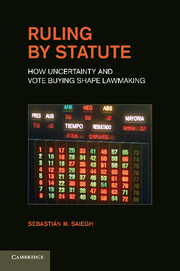Crossref Citations
This Book has been
cited by the following publications. This list is generated based on data provided by Crossref.
Williams, Brian D.
2012.
Institutional Change and Legislative Vote Consensus in New Zealand.
Legislative Studies Quarterly,
Vol. 37,
Issue. 4,
p.
559.
Alemán, Eduardo
2013.
Latin American Legislative Politics: A Survey of Peer-Reviewed Publications in English.
Journal of Politics in Latin America,
Vol. 5,
Issue. 1,
p.
15.
Palanza, Valeria
and
Sin, Gisela
2013.
Item Vetoes and Attempts to Override Them in Multiparty Legislatures.
Journal of Politics in Latin America,
Vol. 5,
Issue. 1,
p.
37.
Palanza, Valeria
and
Sin, Gisela
2014.
Veto Bargaining and the Legislative Process in Multiparty Presidential Systems.
Comparative Political Studies,
Vol. 47,
Issue. 5,
p.
766.
Hiroi, Taeko
and
Renno, Lucio
2014.
Dimensions of Legislative Conflict: Coalitions, Obstructionism, and Lawmaking in Multiparty Presidential Regimes.
Legislative Studies Quarterly,
Vol. 39,
Issue. 3,
p.
357.
Thames, Frank C.
2014.
Uncertainty and Legislative Coalition Building in Post-Communist Ukraine.
SSRN Electronic Journal,
Goodfellow, Tom
2014.
Legal Manoeuvres and Violence: Law Making, Protest and Semi‐Authoritarianism in Uganda.
Development and Change,
Vol. 45,
Issue. 4,
p.
753.
Becher, Michael
and
Christiansen, Flemming Juul
2015.
Dissolution Threats and Legislative Bargaining.
American Journal of Political Science,
Vol. 59,
Issue. 3,
p.
641.
Cheibub, José Antonio
Martin, Shane
and
Rasch, Bjørn Erik
2015.
Government Selection and Executive Powers: Constitutional Design in Parliamentary Democracies.
West European Politics,
Vol. 38,
Issue. 5,
p.
969.
Singh, Shane P.
and
Carlin, Ryan E.
2015.
Happy Medium, Happy Citizens.
Political Research Quarterly,
Vol. 68,
Issue. 1,
p.
3.
Calvo, Ernesto
and
Chasquetti, Daniel
2016.
Legislative success in open sky congresses: weak gatekeeping prerogatives and the loss of majority support.
The Journal of Legislative Studies,
Vol. 22,
Issue. 1,
p.
83.
Bonvecchi, Alejandro
Calvo, Ernesto
and
Stein, Ernesto
2016.
Legislative Knowledge Networks, Status Quo Complexity, and the Approval of Law Initiatives.
Legislative Studies Quarterly,
Vol. 41,
Issue. 1,
p.
89.
Bonvecchi, Alejandro
and
Simison, Emilia
2017.
Lawmaking in Authoritarian Regimes: Spain and Argentina in Comparative Perspective.
SSRN Electronic Journal ,
Zápal, Jan
2017.
Crafting consensus.
Public Choice,
Vol. 173,
Issue. 1-2,
p.
169.
Boranbay-Akan, Serra
König, Thomas
and
Osnabrügge, Moritz
2017.
The imperfect agenda-setter: Why do legislative proposals fail in the EU decision-making process?.
European Union Politics,
Vol. 18,
Issue. 2,
p.
168.
Chaisty, Paul
and
Chernykh, Svitlana
2017.
How Do Minority Presidents Manage Multiparty Coalitions? Identifying and Analyzing the Payoffs to Coalition Parties in Presidential Systems.
Political Research Quarterly,
Vol. 70,
Issue. 4,
p.
762.
Kikuchi, Hirokazu
2018.
Presidents versus Federalism in the National Legislative Process.
p.
145.
Kikuchi, Hirokazu
2018.
Presidents versus Federalism in the National Legislative Process.
p.
1.
Altman, David
2018.
Citizenship and Contemporary Direct Democracy.
Klüver, Heike
and
Zubek, Radoslaw
2018.
Minority governments and legislative reliability.
Party Politics,
Vol. 24,
Issue. 6,
p.
719.





